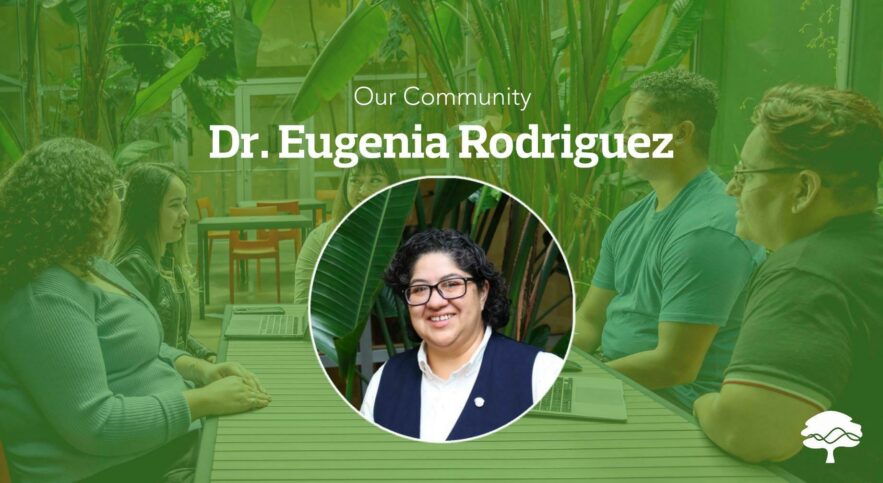Eugenia Rodriguez Psy.D., LMFT, isn’t just a faculty member and program coordinator at Pacific Oaks College. She’s also an alumna.
“The universe works in mysterious ways,” says Dr. Rodriguez, who received her Psy.D. in Marital and Family Therapy from The Chicago School, M.A. in Marriage and Family Therapy: Latinx Family Studies Specialization from Pacific Oaks, and B.A. in Sociology with a concentration in Social Action from Notre Dame de Namur University. Having worked in social services since 1998, she was a case manager when she happened to stop by an event her aunt was hosting. There, she met the then-head of the Latino Family Studies program at Pacific Oaks College. The program’s third cohort was due to start in a week.
Dr. Rodriguez found herself enrolling. “It sounded like a really good something that had perhaps been put in my path,” she says.
The program addressed lifelong areas of focus for her. A first-generation immigrant, she had grown up in a place without many other Mexican children. Her mother was determined for the family to embrace cultures beyond Mexican. “It was important to her that we were able to exist in both spaces,” Dr. Rodriguez says. In what she describes as a youthful rebellion, she had resisted the Mexican side of her identity. Now, in young adulthood, she was learning to embrace it.
As for the need for counseling in marginalized populations, Dr. Rodriguez required no convincing. As a social worker, she had encountered young adults who had endured traumatic abuse, and many had come “to expect not getting what they need.” Few were willing to trust social workers. “Rightfully so,” Dr. Rodriguez adds. “I wouldn’t believe me either.”
Group homes had, and continue to have, many children of color as well as a shortage of caregivers. An overworked case manager might not have the background to recognize trauma related to culture or race, much less to offer meaningful support.
As a graduate student at Pacific Oaks, Dr. Rodriguez was part of a community that was determined to change that. Her cohort of students worked to increase the number of clinicians with the awareness and skills to respond to the needs of Latinx clients.
An intersectional approach
Dr. Rodriguez’s background led her to recognize the intersectional nature of trauma and the need for an intersectional approach to treating it. “In all of these spaces, I was finding LGBTQIA+” clients, she says. “Clinicians didn’t always know how to respond.”
Years later, when she was overseeing the program now called the Latinx Family Studies Specialization, she found herself in conversation with Dr. Jack Paduntin, president of Pacific Oaks. She told him about the need for more clinicians who could provide understanding, affirmative care to LGBTQIA+ clients.
He asked her to draw up a proposal.
She now coordinates Pacific Oaks’ unique on-ground marriage and family therapy program specialization in LGBTQIA+ family studies. Along with a focus on psychology and advocacy, the program includes courses on LGBTQIA+ history and historical trauma. Students learn about the historical biases at the root of discrimination—not just the what but the why.
The Latinx Family Studies specialization involves a similar historical approach. Dr. Rodriguez notes that many students, like her, have a background that is both Latinx and Indigenous. Often, they may feel that their history isn’t fully present because it has been forcibly removed.
To Dr. Rodriguez, these histories are inseparable from the individual, both as client and as clinician. “Our spaces of identity are so interwoven into who we are,” she says. Having learned of her own Mayan and Nahua Otomi heritage as an adult, she now celebrates it.
Tradition and magic
Dr. Rodriguez says, “I tell my students that we go back to who we are: the healers, the shamans, the spirit walkers, [those concerned with] the healing of what you can’t see but can feel. We can’t fix anyone—I’ve never been able to fix anyone—but what I have done is to be able to support them in their healing. And I think that that’s magic.”
At its core, this approach to counseling relies on respect for clients, whom Dr. Rodriguez describes as “the owners and the masters of their own healing—the experts on their lives.” She says, “No one wants you to feel sorry for them. What they need is for you to understand their situation and why they feel the way they do.”
“We have the opportunity to save a life every day.”
“Pacific Oaks changed fundamentally who I was as a person,” Dr. Rodriguez says. Like many professors at Pacific Oaks, she continues to see private clients. She feels lucky to combine education and clinical practice.
As an educator, she wants to provide a supportive role for future clinicians. She hopes they will be able to make positive change in the world. “I tell them, ‘We have the opportunity to save a life every day.’”
Dr. Rodriguez credits her students for inspiring her. “I would like to be the person to plant the seed,” she says. “I may never see the tree grow, but at least I have hope that it’s growing out there.”

